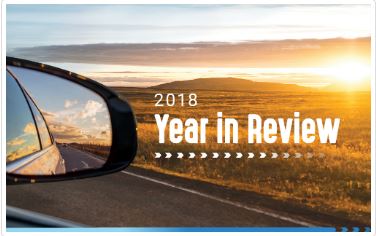2019 January Newsletter

Happy New Year to all our valued clients! Whether you are still relaxing on your summer break or back at work, we wish you and your families a happy and prosperous 2019.
There was no let-up in the pace of economic news in December. The US Federal Reserve lifted interest rates 0.25 per cent as expected to a target range of 2.25-2.5 per cent, the fourth hike of the year. The Fed now forecasts two more increases in 2019 instead of three on concerns about weaker global growth. One sign of falling economic demand is the slide in global oil prices. Brent Crude finished the year down 18 per cent to US$54 a barrel.
In Australia, the Federal Budget is expected to return to surplus in 2019-20, earlier than expected. The Budget deficit stood at $1,816 million in the year to November, the lowest in a decade. Corporate Australia is producing record profits, up 1.9 per cent in the September quarter and 13.5 per cent on an annual basis. Unemployment fell to 5.1 per cent in November, the lowest since 2012.
In the lead-up to Christmas, the national average price for unleaded petrol fell 8c a litre to $1.30, 11c cheaper than a year earlier, on the back of lower oil prices. No wonder consumers had spring in their step. The ANZ-Roy Morgan consumer confidence rating rose to 117.8 points amid the annual Christmas spending spree, well above the long-term average of 113. The only fly in the ointment is the falling property market. National house prices fell 4.8 per cent in 2018, according to CoreLogic, with the biggest falls in Sydney and Melbourne.
2018 Year in Review

The issues that weighed heavily were the unresolved trade dispute between the US and China, confusion over Brexit, rising US interest rates, falling commodity prices and the US government shutdown. Australians were also distracted by political instability and falling house prices in Sydney and Melbourne.
With so much uncertainty about, it was easy to lose sight of the solid progress we’ve made.
Positive economic growth
The global economy grew at a steady 3.1 per cent. However, the World Bank estimates global growth will ease slightly to 3 per cent this year and 2.9 per cent in 2020 as central banks remove monetary stimulus in place since the financial crisis.i
The US economy continued its strong recovery, expanding by 3 per cent in the year to September.
China’s growth slowed to 6.5 per cent, its lowest since 2010, as the trade dispute with the US began to bite.ii
Australia enjoyed steady growth of 2.8 per cent in the year to September after 27 years without recession. Corporate profits are at record levels, inflation is a tame 1.9 per cent, unemployment fell to 5.1 per cent.
Consumers remain cautiously upbeat. The Westpac Melbourne Institute rose a percentage point over the year to 104.4 – anything over 100 is regarded as optimistic.iii
Focus on interest rates
The Australian dollar fell 10 per cent in 2018 to finish at US70c, due largely to US dollar strength and a widening of the gap between local and US interest rates.
The US Federal Reserve lifted rates four times to 2.5 per cent but indicated there may be only two more hikes in 2019, not three as previously forecast, due to the slowing economy. By contrast, Australia’s cash rate finished the year where it started at 1.5 per cent.
At the other end of the yield curve, US 10-year government bond yields were barely changed at 2.7 per cent, reflecting market fears of economic slowdown. Yields on Australian 10-year bonds eased to 2.3 per cent.iv
The lower dollar is good news for our exporters and should soften the impact of falling commodity prices, caught in the cross-hairs of trade wars and fears about an economic slowdown.
Iron ore was down 3 per cent while oil, copper, aluminium, zinc and nickel prices dropped between 16 and 19 per cent. The one bright spot for local producers was wheat, up almost 20 per cent.iv
Shares correction
Global shares retreated as the year came to an end, with the MSCI World Index down 10.4 per cent.v
The US market fell 6.5 per cent, its worst performance in a decade. UK shares fell 12 per cent with no Brexit deal in sight while political and economic uncertainty also weighted heavily on share prices across the Eurozone. In Asia, Chinese shares fell 25.5 per cent while the Japanese market fell 12 per cent.iv
Australian shares tapped into the global mood, with the ASX 200 down 6.9 per cent, its worst year since 2011. However, the total return from shares was down just 3.5 per cent when dividends are added.vi
Property loses steam
The heat came out of Australia’s residential property market in 2018, with big falls in Sydney and Melbourne dragging the national market down 4.8 per cent, according to CoreLogic.vii
This is the biggest annual fall in a decade and follows tighter lending practices, rising supply, higher mortgage interest rate and falling investor demand.
Looking ahead
The late market reversals of 2018 were driven by gloomy expectations rather than the reality of solid economic gains. Future performance will depend on US interest rates, the resolution of trade tensions and the negotiation of a workable Brexit.
In Australia, uncertainty will persist until the Federal election is out of the way. Then investors can get back to focusing on our solid economic growth, a strong corporate sector, resilient consumers, low interest rates and more affordable housing.
i World Bank, 5 June 2018, http://www.worldbank.org/en/news/press-release/2018/06/05/global-economy-to-expand-by-3-1-percent-in-2018-slower-growth-seen-ahead
ii Trading economics, as at September 2018, https://tradingeconomics.com/china/gdp-growth-annual
iii Westpac Melbourne Institute, 12 December 2018, https://melbourneinstitute.unimelb.edu.au/__data/assets/pdf_file/0009/2943036/PressReleaseCSI20181212.pdf
iv Trading economics.
v Financial Times, 1 January 2019, https://markets.ft.com/data/indices/tearsheet/summary?s=MS-WX:MSI
vi Year in Review 2018, CommSec Economic Insights, 2 January 2019
vii CoreLogic, 2 January 2019, https://www.corelogic.com.au/news/australian-dwelling-values-fell-48-through-2018-marking-weakest-housing-market-conditions-0
Financial rules to live by in 2019
 You may have little control over being caught up in a round of redundancies or experiencing the fallout of an international trade war. But you can choose to manage your finances in a way that lets you keep your head above water come what may.
You may have little control over being caught up in a round of redundancies or experiencing the fallout of an international trade war. But you can choose to manage your finances in a way that lets you keep your head above water come what may. Financial rule #1:
Have an emergency fund
A recent NAB/Centre for Social Impact report found one in seven adult Australians had no savings. One in three were just two missed pay cheques away from serious financial stress.iThe advantages of a rainy-day fund are both practical and psychological. If you do suffer an unexpected setback, you’ll have a financial cushion to fall back on. Plus, knowing you have, say, three months’ worth of living expenses set aside will allow you to make unhurried, rational decisions. (There’s a growing body of research that shows financial stress causes people to behave in short-sighted ways likely to deepen their financial distress.)
Financial rule #2:
Get the right insurance
Many Australians who wouldn’t dream of not insuring their home and vehicle are happy to hope for the best when it comes to their income. Surveys suggest only around a third of adult Australians have life insurance, income protection or TPD cover, and many of those are underinsured.iiIf you’re one of that majority of underinsured Australians you may wish to consider the wisdom of insuring your car (which could be replaced for a few thousand dollars) but not doing anything to ensure you – or your dependents, if you’re no longer around – can stay on top of mortgage payments and grocery bills should the income from your job or business disappear.
Financial rule #3:
Be smart about debt
While lenders are beginning to tighten their home-lending criteria, there’s never been a time when credit has been so readily available. Technological advances mean this access is only going to become more ‘frictionless’ during 2019.When it comes to debt, it’s important to understand the difference between the good, the bad and the ugly.
Good debt is used to create wealth, for example, borrowing to buy appreciating assets such as a house or investments. Then there’s acceptable debt, such as getting a car loan so you have the means to get to work. But credit cards, as well as increasingly popular buy-now-pay-later services such as Afterpay and ZipPay, and the short-term online loans offered typically facilitate bad debt, where high-interest credit is used to fund holidays, restaurant meals, clothes shopping and the like.
It’s unrealistic to expect you’ll never splurge using other people’s money but do try to keep it to a minimum, shop around for the best interest rate and repay what you owe as soon as possible.
Financial rule #4:
Forge a positive economic partnership
Money issues can be a major cause of tension in relationships if left unspoken. By opening the lines of communication around money you will not only help build harmony but also make it easier to develop and reach shared goals.You and your better half are unlikely to be at the same point on the saver-spender spectrum, so some conflict is inevitable. Nonetheless, it’s possible to engineer workable compromises around joint finances.
The ‘Yours/Mine/Ours’ method works well for many. It involves each partner getting a set amount of money to do whatever they wish with, allowing them to enjoy some autonomy. The trade-off is that both agree to direct the rest of their disposable income towards reaching mutually agreed goals. For example, paying off the mortgage within five years, making voluntary contributions to super or building a share portfolio.
When it comes to creating economic security for you and your family, small changes in behaviour can make a big difference. If you’d like some help getting your finances in shape for the new year, please call.
i Financial Resilience in Australia 2016, NAB and Centre for Social Impact, p.9,https://www.nab.com.au/content/dam/nabrwd/documents/reports/financial/financial-resilience-report.pdf
ii Life Insurance – Are you underinsured? Canstar, Oct 2016,https://www.canstar.com.au/life-insurance/life-insurance-are-we-underinsured/; Underinsurance in Australia, Finder,https://www.finder.com.au/underinsurance-in-australia
Small steps add up
 Sometimes, when thinking about your long-term financial goals, they can seem so big as to be insurmountable. But the truth is, those that achieve financial success don’t usually do so by encountering a sudden windfall. Rather, they have in place a set of small habits that allow them to work towards their dreams. And by investing small amounts over the long-term, they see big outcomes.
Sometimes, when thinking about your long-term financial goals, they can seem so big as to be insurmountable. But the truth is, those that achieve financial success don’t usually do so by encountering a sudden windfall. Rather, they have in place a set of small habits that allow them to work towards their dreams. And by investing small amounts over the long-term, they see big outcomes. You see it’s much like climbing a mountain. When you start your journey, the summit can seem intimidatingly far off, but with every little step you get closer to your destination.
Your finances work the same way. The small steps you take today could make a big difference in the future.
Increasing your savings through automation
They say it takes 60 days to establish a new habit. Automating a transfer into a savings account on the other hand takes all of a few minutes. Starting with a small amount that you won’t miss is the best way to go. Frequent regular payments —$50 a week is easier to bear than $200 a month—will mean you don’t feel the pinch.When choosing an amount to set aside, you want to ensure it’s a sacrifice you can bear so that you can still enjoy the little things, and not so large as that you’ll have to dip in during the month.
As you adjust to these subtle budget tweaks, you can incrementally increase your automated savings contributions over time.
Working down debt by increasing repayments
The same principle applies for your debt repayments. Even committing to a small increase could make a big difference in how quickly you pay off your debts.Once you’ve decided to commit a little bit more towards paying down your debt, it’s time to consider your repayment strategies. Here a few options you may wish to consider.
- Proportional method: after meeting your minimum repayments split the remaining proportionally between your debts.
- Avalanche method: list your debts in order of the size of the interest and, after meeting your minimums on all of them, pay off the highest one first.
- Snowball method: Direct all excess funds into paying off your smallest debt first. The theory goes that as the smallest one should be an easy victory, it will give you a sense of achievement. As you continue to pay off the debts from smallest to largest, this sense of accomplishment could snowball.
- Debt consolidation: In some case, you may be able to consolidate multiple debts into the one low interest account.
Building your nest egg
No matter where you are on your journey towards retirement, small incremental additions to your super could make a big difference to the overall size of your nest egg.A popular way to approach this is through concessional super contributions. Often called salary sacrificing, it works by your employer redirecting a portion of your pre-tax income (above the standard 9.5% contribution they already pay) towards your superannuation. This can have a number of benefits: it’s taxed at a lower rate, and money in your super account continues to generate compound interest over the long term. This can make a big difference to your nest egg when you eventually retire.
Concessional super contributions are capped at $25,000 per financial year and can be tax effective if you’re earning over $37,000.i
Sometimes the smallest financial habits are the ones that bear the most fruit over the long term. So, this year why not make some small changes that will really add up.
We can help you maintain your lifestyle while working towards your goals.
i https://www.moneysmart.gov.au/superannuation-and-retirement/how-super-works/super-contributions
Please note this information is of a general nature only and has been provided without taking account of your objectives, financial situation or needs. Because of this, we recommend you consider, with or without the assistance of a financial advisor, whether the information is appropriate in light of your particular needs and circumstances.
Copyright in the information contained in this site subsists under the Copyright Act 1968 (Cth) and, through international treaties, the laws of many other countries. It is owned by EFDB Pty Ltd unless otherwise stated. All rights reserved. You may download a single copy of this document and, where necessary for its use as a reference, make a single hard copy. Except as permitted under the Copyright Act 1968 (Cth) or other applicable laws, no part of this publication may be otherwise reproduced, adapted, performed in public or transmitted in any form by any process without the specific written consent of EFDB Pty Ltd.
EFDB Pty Ltd | Sydney CBD | Northern Beaches | ABN 64 112 871 922 | AFSL 311720
Categories
- Blogs (51)
- Budget (19)
- Community and Sponsorships (5)
- Cyber Security (3)
- Economic / Topical (36)
- End of Financial Year (8)
- Estate Planning (4)
- Foreign Exchange (1)
- Gifting (2)
- Health (16)
- Insurances (18)
- Investments (29)
- Lifestyle (41)
- Newsletters (55)
- Retirement (19)
- Share Buyback (1)
- Superannuation (27)
Recent Posts
Archives
- November 2022 (1)
- May 2022 (1)
- April 2022 (1)
- February 2022 (1)
- December 2021 (1)
- November 2021 (1)
- September 2021 (1)
- June 2021 (1)
- May 2021 (1)
- April 2021 (1)
- March 2021 (1)
- February 2021 (1)
- January 2021 (1)
- December 2020 (1)
- October 2020 (1)
- September 2020 (1)
- August 2020 (1)
- July 2020 (1)
- June 2020 (1)
- May 2020 (1)
